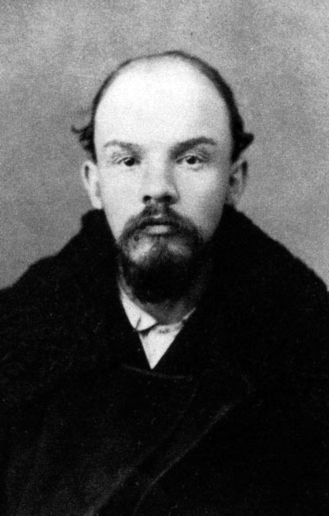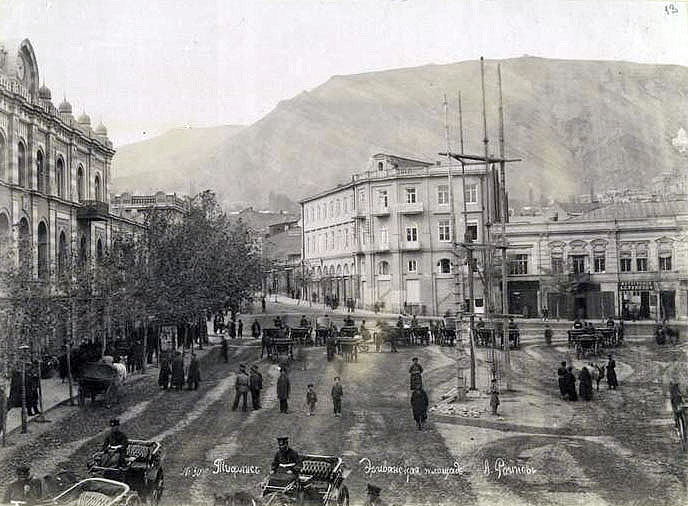|
1907 Tiflis Bank Robbery
The 1907 Tiflis bank robbery, also known as the Erivansky Square expropriation, was an armed robbery on 26 June 1907 in the city of Tiflis in the Tiflis Governorate in the Caucasus Viceroyalty of the Russian Empire (now Georgia's capital, Tbilisi). A bank cash shipment was stolen by Bolsheviks to fund their revolutionary activities. The robbers attacked a bank stagecoach, and the surrounding police and soldiers, using bombs and guns while the stagecoach was transporting money through Erivansky Square (now Freedom Square) between the post office and the Tiflis branch of the State Bank of the Russian Empire. The attack killed forty people and injured fifty others, according to official archive documents. The robbers escaped with 241,000 rubles.(White, James D. ''Red Hamlet: The Life and Ideas of Alexander Bogdanov,'' 2018, p. 179). The robbery was organized by a number of top-level Bolsheviks, including Vladimir Lenin, Joseph Stalin, Maxim Litvinov, Leonid Krasin, and Alexan ... [...More Info...] [...Related Items...] OR: [Wikipedia] [Google] [Baidu] |
Freedom Square, Tbilisi
Freedom Square or Liberty Square is located in the center of Tbilisi, Georgia, at the eastern end of Rustaveli Avenue. (In Georgian, it is თავისუფლების მოედანი ''Tavisuplebis moedani'', pronounced ). Under Imperial Russia it was known as Erivansky or Paskevich-Erivansky Square (Georgian: ერევანსკის მოედანი, ''Erevansk'is moedani'', Russian: Эриванская площадь, ''Erivanskaya ploshchad''.) While part of the Soviet Union, it was Beria Square (Georgian: ბერიას მოედანი, ''Berias moedani'') and Lenin Square (Georgian: ლენინის მოედანი, ''Leninis moedani''). History The square was originally named after Ivan Paskevich, Count of Erivan, a general in the Russian Imperial Army of Ukrainian descent, who earned his title in honor of his conquest of Erivan (present-day Yerevan) for the Russian Empire. During the Soviet era, the square was renamed twic ... [...More Info...] [...Related Items...] OR: [Wikipedia] [Google] [Baidu] |
Russian Ruble
''hum''; cv, тенкĕ ''tenke''; kv, шайт ''shayt''; Lak: къуруш ''k'urush''; Mari: теҥге ''tenge''; os, сом ''som''; tt-Cyrl, сум ''sum''; udm, манет ''manet''; sah, солкуобай ''solkuobay'' , name_abbr = руб, Rbl , image_1 = Banknote_5000_rubles_2010_front.jpg , image_title_1 = banknote of the current series , image_2 = Rouble coins.png , image_title_2 = Coins , iso_code = RUB , date_of_introduction = 14 July 1992:RUR (1 SUR = 1 RUR)1 January 1998:RUB (1,000 RUR = 1 RUB) , replaced_currency = Soviet ruble (SUR) , using_countries = , unofficial_users = , inflation_rate = 12.0% (November 2022) , inflation_source_date Bank of Russia, inflation_method = CPI , unit = ruble , subunit_ratio_1 = , subunit_name_1 = kopeyka (копейка) ''tiyen''; ba, тин ''tin''; cv, пус ''pus''; os, капекк ''kapekk''; udm, коны ''kony''; Mari: ыр ''yr''; sah, харчы ''harchy'' , symbo ... [...More Info...] [...Related Items...] OR: [Wikipedia] [Google] [Baidu] |
Menshevik
The Mensheviks (russian: меньшевики́, from меньшинство 'minority') were one of the three dominant factions in the Russian socialist movement, the others being the Bolsheviks and Socialist Revolutionaries. The factions emerged in 1903 following a dispute within the Russian Social Democratic Labour Party (RSDLP) between Julius Martov and Vladimir Lenin. The dispute originated at the 2nd Congress of the RSDLP, ostensibly over minor issues of party organization. Martov's supporters, who were in the minority in a crucial vote on the question of party membership, came to be called ''Mensheviks'', derived from the Russian ('minority'), while Lenin's adherents were known as ''Bolsheviks'', from ('majority'). Despite the naming, neither side held a consistent majority over the course of the entire 2nd Congress, and indeed the numerical advantage fluctuated between both sides throughout the rest of the RSDLP's existence until the Russian Revolution. The split ... [...More Info...] [...Related Items...] OR: [Wikipedia] [Google] [Baidu] |
Socialist Revolutionaries
The Socialist Revolutionary Party, or the Party of Socialist-Revolutionaries (the SRs, , or Esers, russian: эсеры, translit=esery, label=none; russian: Партия социалистов-революционеров, ), was a major political party in late Imperial Russia, and both phases of the Russian Revolution and early Soviet Russia. The SRs were agrarian socialists and supporters of a democratic socialist Russian republic. The ideological heirs of the Narodniks, the SRs won a mass following among the Russian peasantry by endorsing the overthrow of the Tsar and the redistribution of land to the peasants. The SRs boycotted the elections to the First Duma following the Revolution of 1905 alongside the Russian Social Democratic Labour Party, but chose to run in the elections to the Second Duma and received the majority of the few seats allotted to the peasantry. Following the 1907 coup, the SRs boycotted all subsequent Dumas until the fall of the Tsar in the February R ... [...More Info...] [...Related Items...] OR: [Wikipedia] [Google] [Baidu] |
Anarchists
Anarchism is a political philosophy and movement that is skeptical of all justifications for authority and seeks to abolish the institutions it claims maintain unnecessary coercion and hierarchy, typically including, though not necessarily limited to, governments, nation states, and capitalism. Anarchism advocates for the replacement of the state with stateless societies or other forms of free associations. As a historically left-wing movement, usually placed on the farthest left of the political spectrum, it is usually described alongside communalism and libertarian Marxism as the libertarian wing (libertarian socialism) of the socialist movement. Humans lived in societies without formal hierarchies long before the establishment of formal states, realms, or empires. With the rise of organised hierarchical bodies, scepticism toward authority also rose. Although traces of anarchist thought are found throughout history, modern anarchism emerged from the Enlightenment. D ... [...More Info...] [...Related Items...] OR: [Wikipedia] [Google] [Baidu] |
Proletarian Revolution
A proletarian revolution or proletariat revolution is a social revolution in which the working class attempts to overthrow the bourgeoisie and change the previous political system. Proletarian revolutions are generally advocated by socialists, communists and anarchists. The concept of a revolutionary proletariat was first put forward by the French revolutionary socialist and radical Auguste Blanqui. Marxists believe proletarian revolutions can and will likely happen in all capitalist countries, related to the concept of world revolution. The Leninist branch of Marxism argues that a proletarian revolution must be led by a vanguard of "professional revolutionaries", men and women who are fully dedicated to the communist cause and who form the nucleus of the communist revolutionary movement. This vanguard is meant to provide leadership and organization to the working class before and during the revolution, which aims to prevent the government from successfully ending it. Vladimi ... [...More Info...] [...Related Items...] OR: [Wikipedia] [Google] [Baidu] |
Marxism
Marxism is a Left-wing politics, left-wing to Far-left politics, far-left method of socioeconomic analysis that uses a Materialism, materialist interpretation of historical development, better known as historical materialism, to understand Social class, class relations and social conflict and a dialectical perspective to view social transformation. It originates from the works of 19th-century German philosophers Karl Marx and Friedrich Engels. As Marxism has developed over time into various branches and schools of thought, no single, definitive Marxist philosophy, Marxist theory exists. In addition to the schools of thought which emphasize or modify elements of classical Marxism, various Marxian concepts have been incorporated and adapted into a diverse array of Social theory, social theories leading to widely varying conclusions. Alongside Marx's critique of political economy, the defining characteristics of Marxism have often been described using the terms dialectical mater ... [...More Info...] [...Related Items...] OR: [Wikipedia] [Google] [Baidu] |
Communist Party Of The Soviet Union
"Hymn of the Bolshevik Party" , headquarters = 4 Staraya Square, Moscow , general_secretary = Vladimir Lenin (first) Mikhail Gorbachev (last) , founded = , banned = , founder = Vladimir Lenin , newspaper = ''Pravda'' , position = Far-left , international = , religion = State Atheism , predecessor = Bolshevik faction of the RSDLP , successor = UCP–CPSU , youth_wing = Little Octobrists Komsomol , wing1 = Young Pioneers , wing1_title = Pioneer wing , affiliation1_title = , affiliation1 = Bloc of Communists and Non-Partisans (1936–1991) , membership = 19,487,822 (early 1989 ) , ideology = , colours = Red , country = the Soviet Union The Communist Party of the Soviet Union (CPSU),; abbreviated in Russian as or also known by various other names during its history, was the founding and ruling party of the Soviet Union. Th ... [...More Info...] [...Related Items...] OR: [Wikipedia] [Google] [Baidu] |
Russian Revolution
The Russian Revolution was a period of Political revolution (Trotskyism), political and social revolution that took place in the former Russian Empire which began during the First World War. This period saw Russia abolish its monarchy and adopt a socialist form of government following two successive revolutions and a bloody civil war. The Russian Revolution can also be seen as the precursor for the other European revolutions that occurred during or in the aftermath of WWI, such as the German Revolution of 1918–1919, German Revolution of 1918. The Russian Revolution was inaugurated with the February Revolution in 1917. This first revolt focused in and around the then-capital Petrograd (now Saint Petersburg). After major military losses during the war, the Russian Army had begun to mutiny. Army leaders and high ranking officials were convinced that if Nicholas II of Russia, Tsar Nicholas II abdicated, the domestic unrest would subside. Nicholas agreed and stepped down, usher ... [...More Info...] [...Related Items...] OR: [Wikipedia] [Google] [Baidu] |
German Empire
The German Empire (),Herbert Tuttle wrote in September 1881 that the term "Reich" does not literally connote an empire as has been commonly assumed by English-speaking people. The term literally denotes an empire – particularly a hereditary empire led by an emperor, although has been used in German to denote the Roman Empire because it had a weak hereditary tradition. In the case of the German Empire, the official name was , which is properly translated as "German Empire" because the official position of head of state in the constitution of the German Empire was officially a "presidency" of a confederation of German states led by the King of Prussia who would assume "the title of German Emperor" as referring to the German people, but was not emperor of Germany as in an emperor of a state. –The German Empire" ''Harper's New Monthly Magazine''. vol. 63, issue 376, pp. 591–603; here p. 593. also referred to as Imperial Germany, the Second Reich, as well as simply Germany, ... [...More Info...] [...Related Items...] OR: [Wikipedia] [Google] [Baidu] |
Social Democrats
Social democracy is a political, social, and economic philosophy within socialism that supports political and economic democracy. As a policy regime, it is described by academics as advocating economic and social interventions to promote social justice within the framework of a liberal-democratic polity and a capitalist-oriented mixed economy. The protocols and norms used to accomplish this involve a commitment to representative and participatory democracy, measures for income redistribution, regulation of the economy in the general interest, and social welfare provisions. Due to longstanding governance by social democratic parties during the post-war consensus and their influence on socioeconomic policy in Northern and Western Europe, social democracy became associated with Keynesianism, the Nordic model, the social-liberal paradigm, and welfare states within political circles in the late 20th century. It has been described as the most common form of Western or modern ... [...More Info...] [...Related Items...] OR: [Wikipedia] [Google] [Baidu] |








